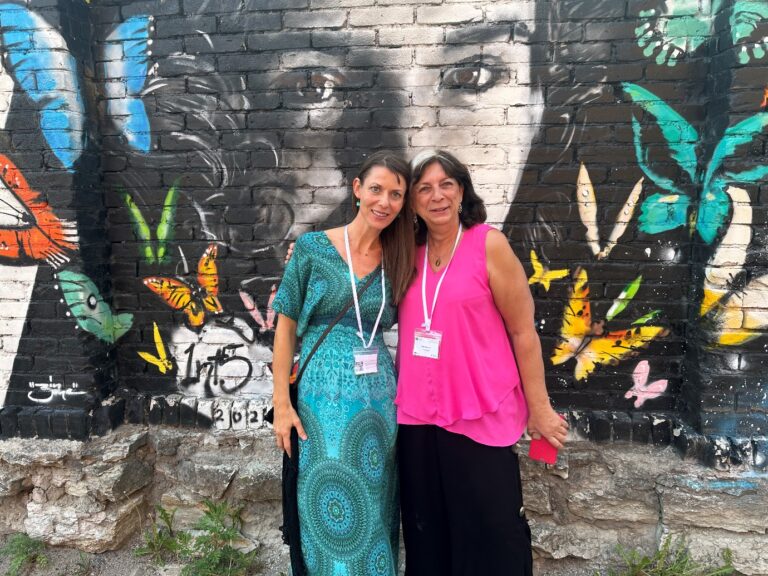This year marks the 30th anniversary of the 1994 Genocide against the Tutsi in Rwanda. Between April and July 1994, and estimated 800,000 to million people were killed and an upward of 350,000 women were raped. As an internally recognised expert on sexual violence committed during the genocide and on transitional justice initiatives that dealt with these atrocities, I presented on my research at several events between April and July this year. Some of these events were held specifically to commemorate the genocide. In April, I was invited to attend a thought-provoking, international symposium at Clark University in Worcester, Massachusetts.
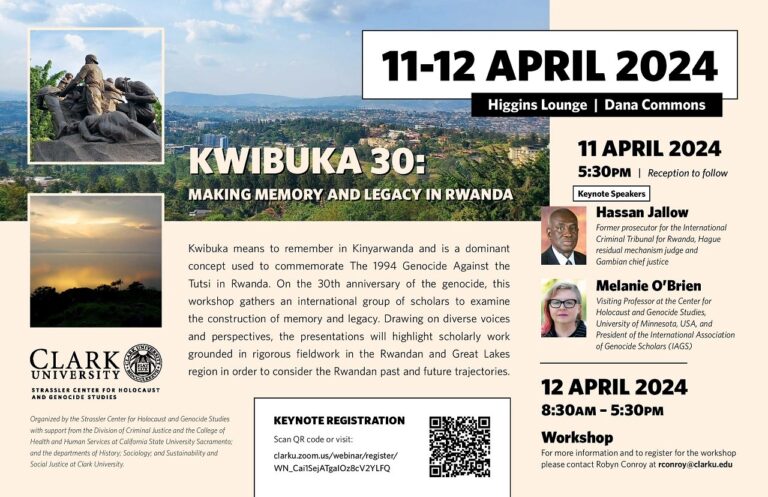
The two-day symposium, titled “Kwibuka 30: Making Memory and Legacy in Rwanda,” funded by the Strassler Centre for Holocaust and Genocide Studies at Clark University, brought together an international and interdisciplinary cohort of scholars.
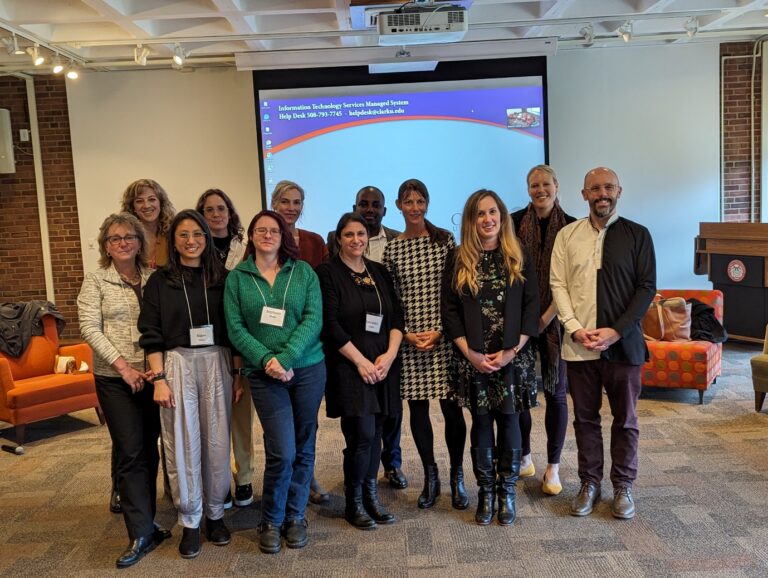
Symposium attendees
The symposium featured two keynote lectures, one by Justice Hassan Bubacar Jallow, former Chief Prosecutor of the UN International Criminal Tribunal for Rwanda (ICTR), and another by Melanie O’Brien, Associate Professor of International Law at the University of Western Australia. Melanie O’Brien shared insights on recent developments in cases related to the Genocide Convention brough before the International Court of Justice (ICJ). Justice Jallow reflected on the achievements and challenges of prosecuting the leaders of the Genocide against the Tutsi, drawing on his extensive experience at the ICTR and other international courts.
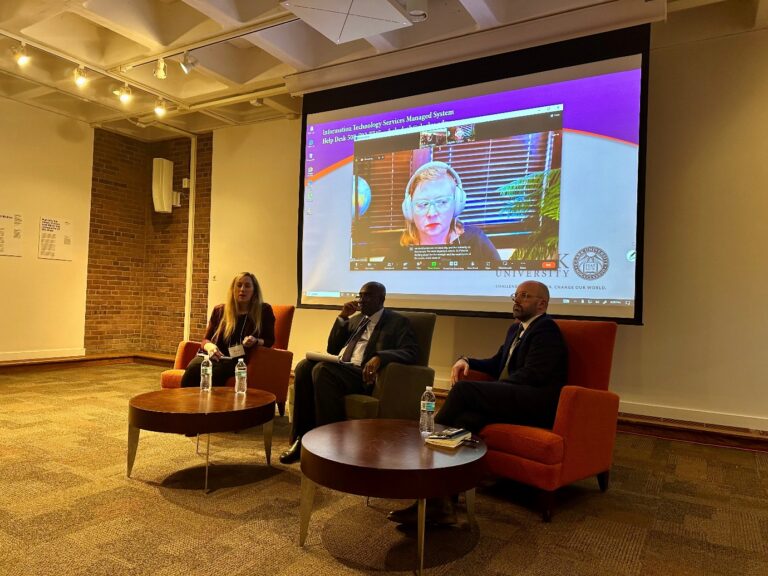
Throughout the symposium, I had the great privilege of engaging with Justice Jallow, gaining valuable insights into the inner workings of the prosecution team and the complexities of preparing and presenting cases against genocide suspects at the ICTR. For example, he shared some background information about the “laughing judges”, a situation that researchers in international justice and/or sexual violence may be familiar with.
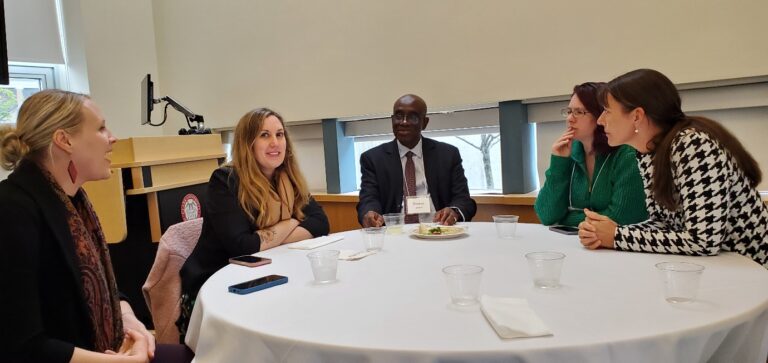
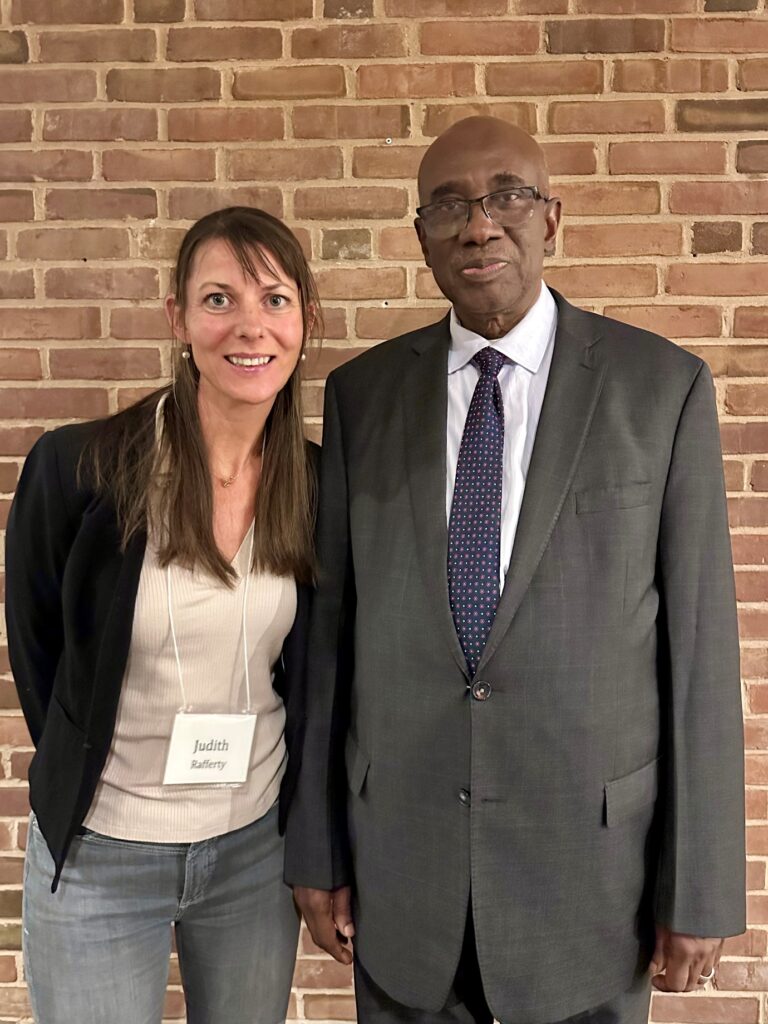
Judith and Justice Jallow
Beside the key notes, the symposium comprised a one-day workshop focused on scholarship on the Genocide against the Tutsi. Together with the other workshop participants, I discussed the question of who gets to tell Rwanda’s story and the challenges of representation in scholarship. The workshop format included pre-circulation of papers, brief summaries by the author(s), followed by a 30-minutes group discussion for each paper. As part of a panel on “actors, violence, and survival,” I presented my research on Rwandan women who suffered sexual violence during the genocide and subsequently had their cases tried at Rwanda’s community courts, known as “gacaca.”
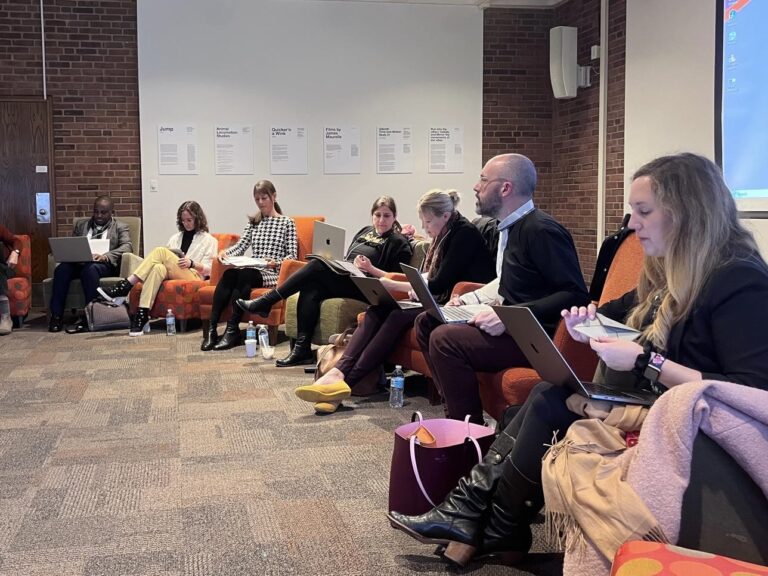
My presentation, titled “Giving Voice to those Who Suffer in Silence: Challenges of Including the Stories of Victim-Survivors in the Public Discourse of the Genocide against the Tutsi,” shed light on the experiences and consequences faced by Rwandan victim-survivors of sexual violence, including physical, psychological, social, and economic repercussions.
My contribution to the symposium deepened the ongoing dialogue on critical issues experienced by Rwandan victim-survivors, including stigma and community ostracism, which I had previously explored in a policy brief co-authored with US scholar Nicole Fox, one of the organizers of the Kwibuka 30 event.
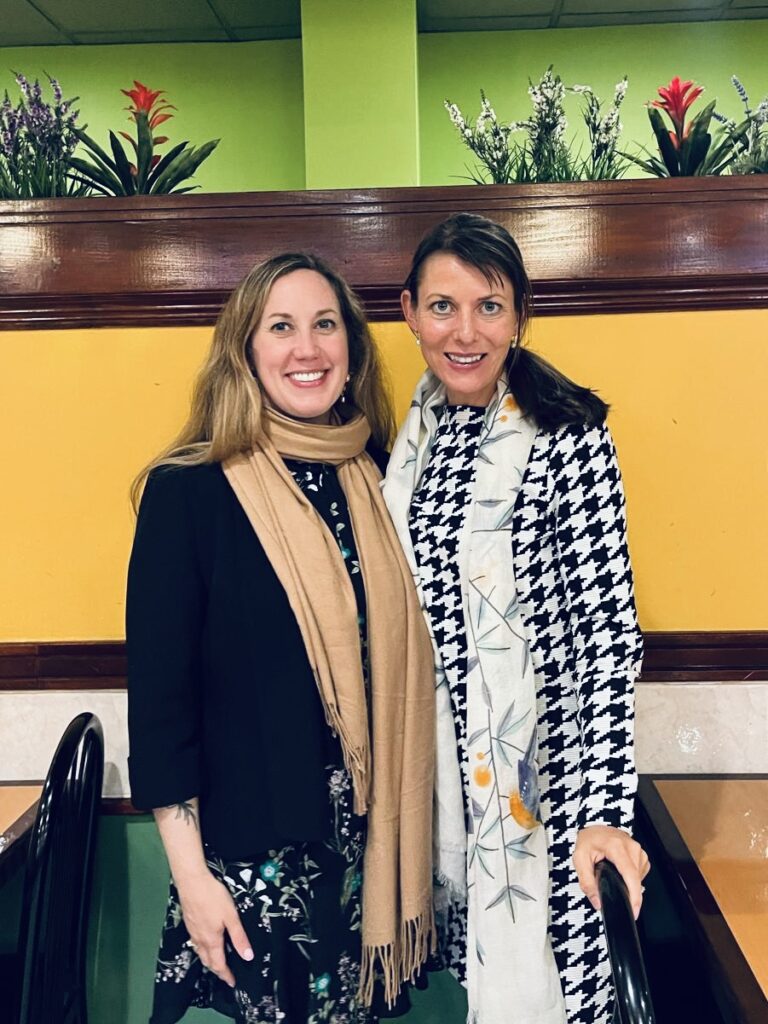
Judith with Dr Nicole Fox
The paper that I presented during the Kwibuka 30 workshop constitutes a chapter in my forthcoming book “Justice Needs of Victim-Survivors of conflict-related Sexual Violence: Post-Genocide Justice and the Rwandan Gacaca Courts” (working title). The Kwibuka 30 Symposium provided a platform for meaningful reflection, collaboration, and exchange of ideas with scholars from various disciplines, contributing to a broader understanding of the genocide and its lasting impact on Rwanda and the world.
Presentation at Rwandan High Commissioner to Australia event at UTS in Sydney
In May, I was invited to give a presentation as part of a public lecture event funded by the Rwandan High Commissioner to Australia at the University of Technology (UTS) in Sydney. My presentation focused on social stigma suffered by Rwandan victim-survivors of sexual violence, as well as the relational harm caused to Rwandan networks by the sexual violence. I discussed the achievements and limitations of Rwandan community courts that combined both retributive and restorative justice elements and highlighted the need for and potential of future restorative practices initiatives to help address persisting relational damage of victims-survivors, their families and their communities.
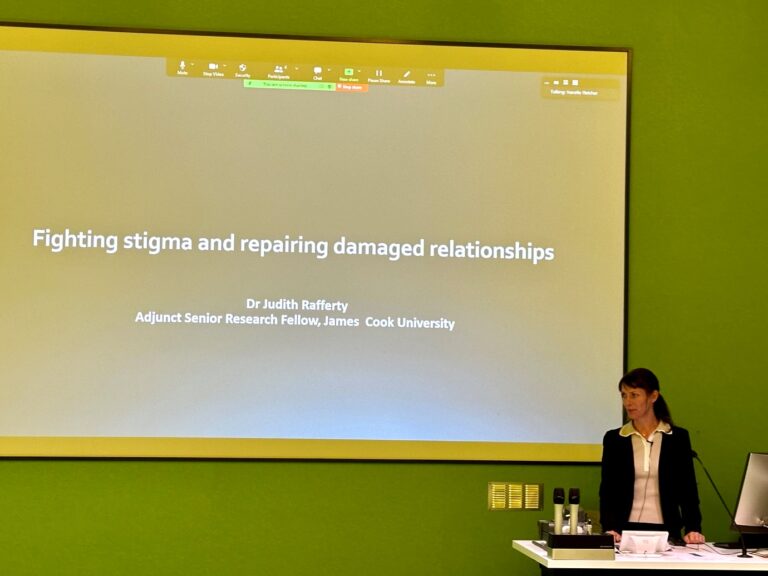
Presenting at the conference of the European Forum for Restorative Justice in Tallin, Estonia.
From the 28th to 31st May, I also attended the conference of the European Forum for Restorative Justice in Tallin, Estonia. While this bi-annual conference generally focuses on RJ in Criminal Justice in European countries, this year’s conference theme “Restorative Justice Responses in Dark Times, focused on the potential and application of RJ in wars, conflict and polarisation, provided a great opportunity for me to present on my research with Rwandan victim-survivors.
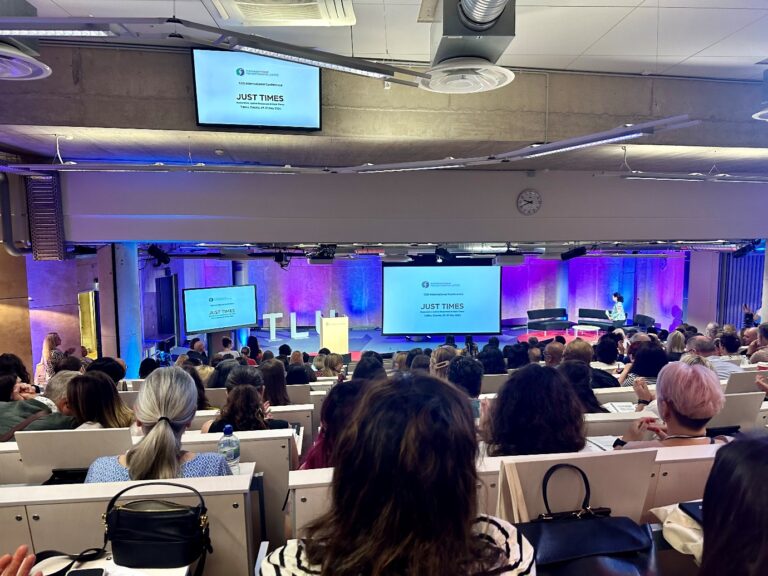
At the conference, I found particularly inspiring the experiences of students at Rondine Citadella della Pace in Italy, a place where students from different current and past conflict zones (frequently from opposing conflict parties such as Armenia and Azerbaijan) study and live together for two years as part of a unique residential peacebuilding program. Following the Rondine Method: A relational Approach to Conflict, students work in pairs, with each person representing one side of a conflict. Together, they develop projects to implement in their home countries when they return after completing the program.
In my own conference presentation, titled “Fighting Stigma and Reconnection Lives after conflict-related sexual violence”, I outlined the social and relational harms experienced by women who were raped during the genocide in Rwanda, and discussed the value of therapeutic/ support groups to help victims-survivors’ heal from trauma and reconnect to others around them.
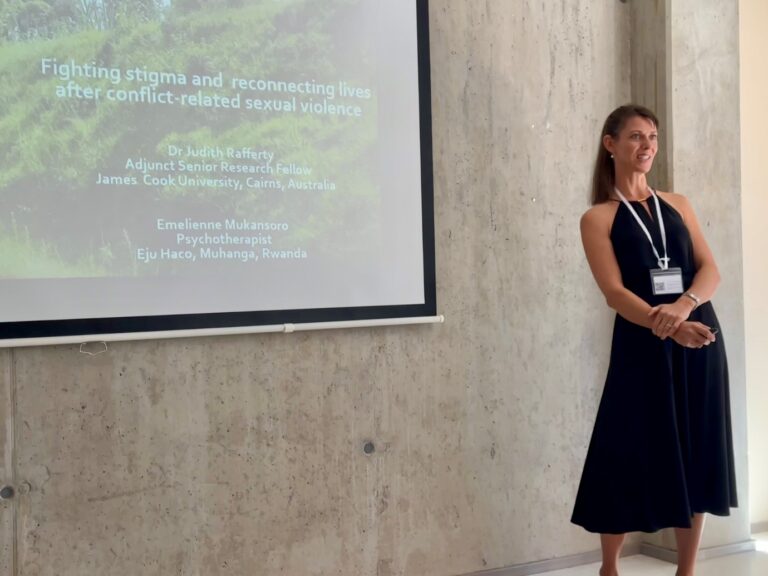
370 delegates attended the conference, mainly from European countries, but also from other places around the world. Deb Black and I were the only two delegates from Australia, which we celebrated at the social event of the conference.
